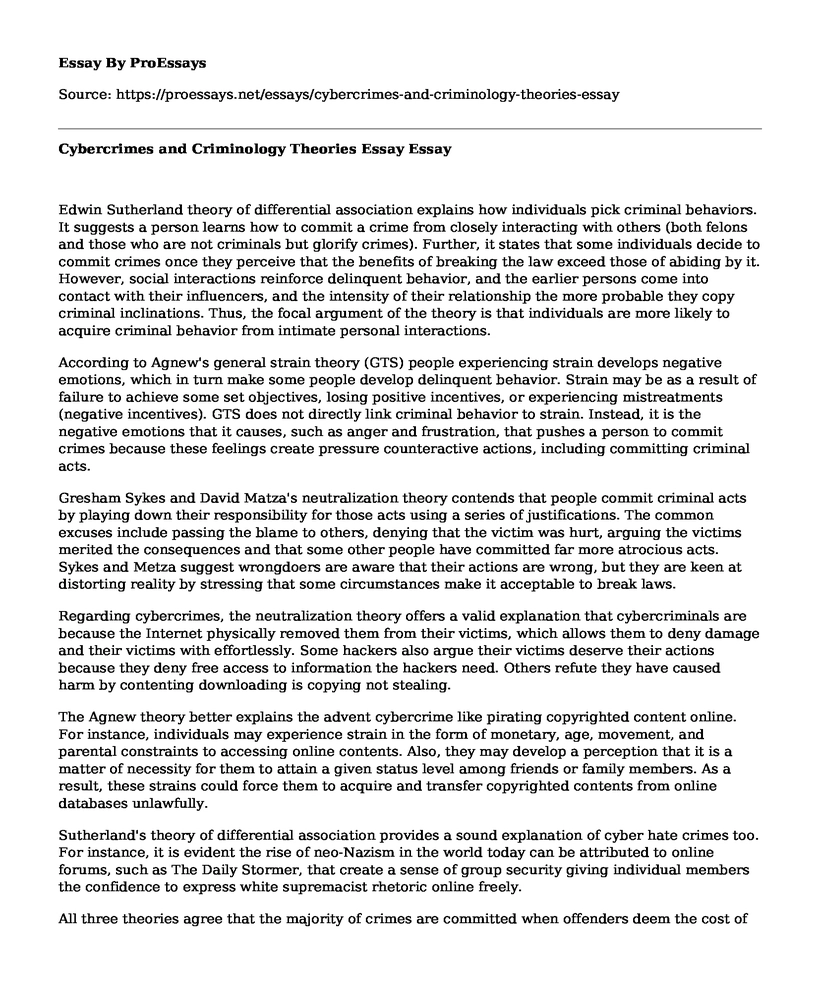Edwin Sutherland theory of differential association explains how individuals pick criminal behaviors. It suggests a person learns how to commit a crime from closely interacting with others (both felons and those who are not criminals but glorify crimes). Further, it states that some individuals decide to commit crimes once they perceive that the benefits of breaking the law exceed those of abiding by it. However, social interactions reinforce delinquent behavior, and the earlier persons come into contact with their influencers, and the intensity of their relationship the more probable they copy criminal inclinations. Thus, the focal argument of the theory is that individuals are more likely to acquire criminal behavior from intimate personal interactions.
According to Agnew's general strain theory (GTS) people experiencing strain develops negative emotions, which in turn make some people develop delinquent behavior. Strain may be as a result of failure to achieve some set objectives, losing positive incentives, or experiencing mistreatments (negative incentives). GTS does not directly link criminal behavior to strain. Instead, it is the negative emotions that it causes, such as anger and frustration, that pushes a person to commit crimes because these feelings create pressure counteractive actions, including committing criminal acts.
Gresham Sykes and David Matza's neutralization theory contends that people commit criminal acts by playing down their responsibility for those acts using a series of justifications. The common excuses include passing the blame to others, denying that the victim was hurt, arguing the victims merited the consequences and that some other people have committed far more atrocious acts. Sykes and Metza suggest wrongdoers are aware that their actions are wrong, but they are keen at distorting reality by stressing that some circumstances make it acceptable to break laws.
Regarding cybercrimes, the neutralization theory offers a valid explanation that cybercriminals are because the Internet physically removed them from their victims, which allows them to deny damage and their victims with effortlessly. Some hackers also argue their victims deserve their actions because they deny free access to information the hackers need. Others refute they have caused harm by contenting downloading is copying not stealing.
The Agnew theory better explains the advent cybercrime like pirating copyrighted content online. For instance, individuals may experience strain in the form of monetary, age, movement, and parental constraints to accessing online contents. Also, they may develop a perception that it is a matter of necessity for them to attain a given status level among friends or family members. As a result, these strains could force them to acquire and transfer copyrighted contents from online databases unlawfully.
Sutherland's theory of differential association provides a sound explanation of cyber hate crimes too. For instance, it is evident the rise of neo-Nazism in the world today can be attributed to online forums, such as The Daily Stormer, that create a sense of group security giving individual members the confidence to express white supremacist rhetoric online freely.
All three theories agree that the majority of crimes are committed when offenders deem the cost of breaking the law is lower than that of abiding by it. Additionally, both Sutherland and Agnew agree that factors that influence a person to become a delinquent depend on its intensity. This argument forestalls the existence of a chance to intervene in a situation where a potential wrongdoer has not gone too far into the world of lawbreaking.
Cite this page
Cybercrimes and Criminology Theories Essay. (2022, Feb 17). Retrieved from https://proessays.net/essays/cybercrimes-and-criminology-theories-essay
If you are the original author of this essay and no longer wish to have it published on the ProEssays website, please click below to request its removal:
- The Impact of the Mental Capacity Act of 2005
- Analysis of Cases
- Essay on Racism and Hate Crimes: A Look Into the Past and Present
- Essay Example on 19th Century Identification & Crime Investigation
- Research Paper on Aaron Burr's Role in Passing 12th Amendment to US Constitution
- Paper Example on Appellant Fails to Convict of 1st Degree Murder in Supreme Court
- Paper Sample on Consumer Protection in E-Commerce: Return & Refund Policies







